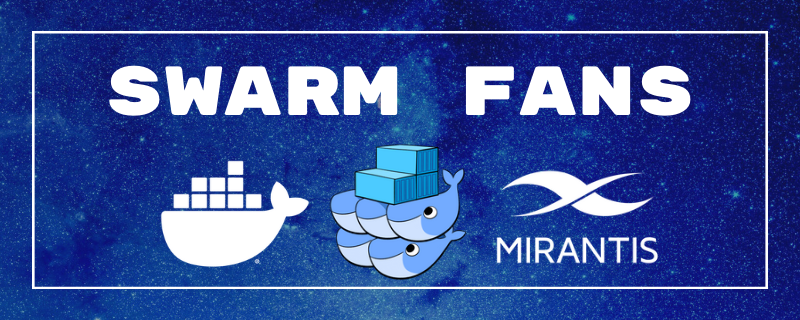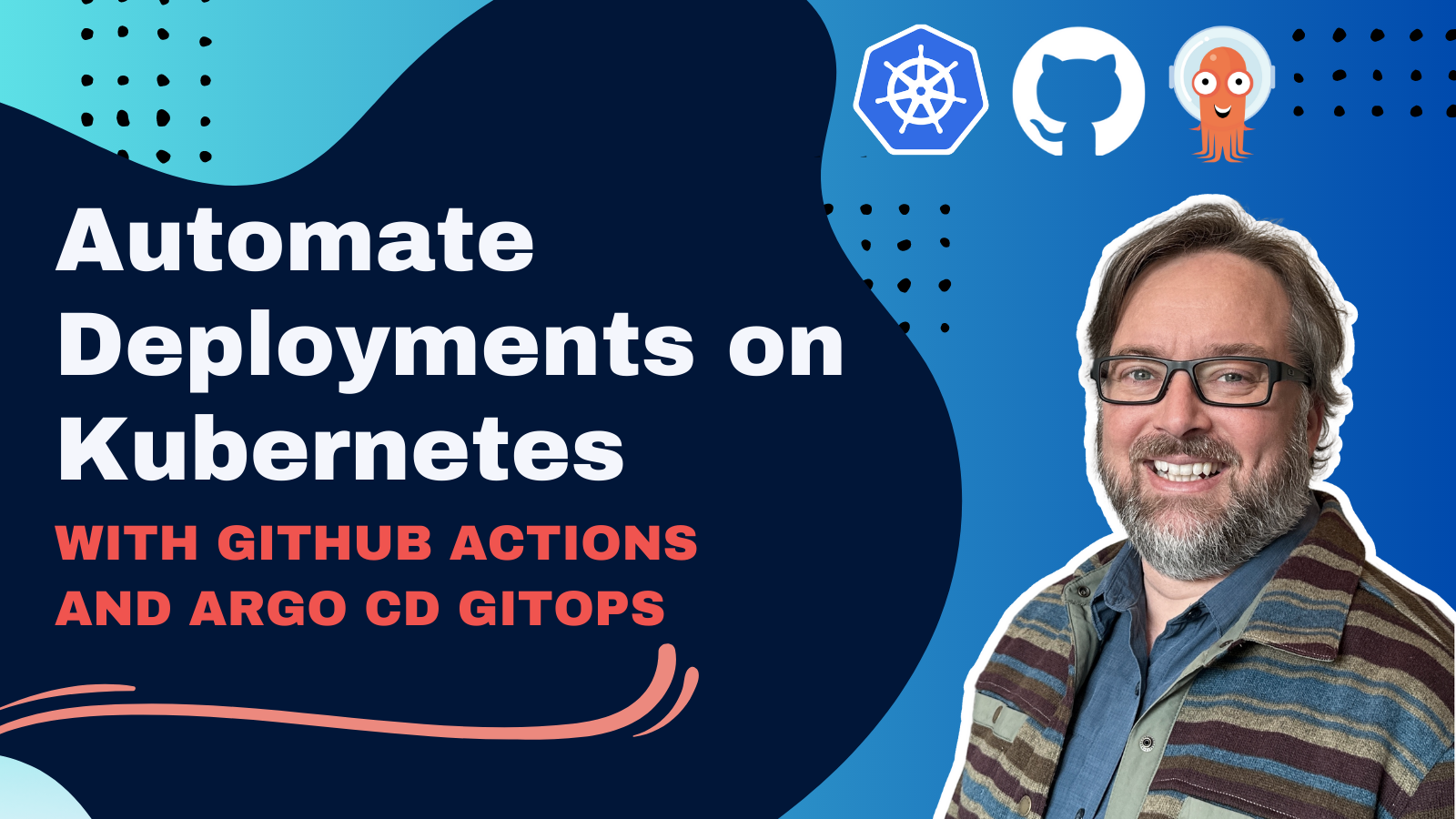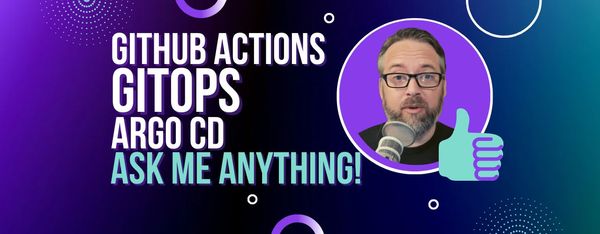🗓️ What's new this week
Special GitHub Actions & GitOps Q&A in Zoom
Friday! I'm holding a Q&A for all interested. I'm doing it in Zoom so we can have video discussions.
It's free!
If you'd like to understand more about GitHub Actions and/or Argo CD, or if you're curious about what my new course is all about, join the Zoom call on Friday at 12:00 US ET (UTC-4). Register here. Sure, we can read documentation or watch generic getting started videos, but many of us want to go deeper and deal with our own specific implementation issues. Plus, it's also necessary to learn how multiple tools work together. In all this time teaching containers, I find one of the hardest parts is understanding the end-to-end workflow for getting software out of a developer's hands and into production servers. So, if you're curious, register for the Zoom.
🔴 Live show: Cloud Native DevOps: Live Q&A (Ep 222)
This week is our 100% ask-me-anything show with you! I'm joined by Matt and we're focused on cloud native DevOps Q&A.
Thursday, Jun 22, at 13:00 US ET (UTC-4)
You can add it and future shows to your calendar here.
🥳 Cloud Native DevOps Discord hits L3 perks!
Thanks to Martin Braun, nadershaar, Brendon Thiede, Payam, and Eric Smalling for BOOSTING this server! Our Discord server is now Level 3 Perks, meaning many additional features I'm working to roll out for all Members.
We're now over 14,600 members, with nearly 1,000 messages a month.
We have a new public Discord Discovery page, and fancy Discord URL discord.gg/devops (which points to the same place as devops.fan)
Server moderator Martin Braun has volunteered to host a Swarm Fans monthly audio/video hangout. The first one is Friday July 7th.

🗓 Next big thing️

🐦 Tweet of the week

🔴 Thoughts on last weeks Live show: Future of Containers with Brendan Burns (Ep 221), June 15, 2023
On last week's Live show, we had a special guest: Brendan Burns, CVP Azure Cloud Native & Resource Management and also a founding member of the Kubernetes project.
We talked about ways to run containers on Azure, Dapr, WebAssembly on Azure Kubernetes, Wasmtime, Twelve-Factor App, and more.
Because Brendan is one of the three original co-founders of the Kubernetes project at Google back in 2013, he's a little bit famous in the cloud native world and in open source in general. I had so many questions. We could've spent multiple shows on everything from the origin of Kubernetes to what he's working on in Azure. A lot of those topics have already been covered in many other great interviews with him over the years. So we took some live questions as we always do from the YouTube audience.
I think my favorite part of the show was where we talk about the next layers of abstraction, or maybe even the ways we can deploy to Kubernetes or make it simpler to manage and deploy to. That's been a real challenge for the community ever since Kubernetes was created – making it more accessible to more people, without it being so complex to manage and deal with underneath.
It was a great show and I hope you enjoy it. We'll release the audio podcast version soon.
👀 In case you missed it
(headlines from last week's newsletter)
GitHub Actions workflow and job design
In last week's newsletter, I provided a copy of my LinkedIn post where I talk about GitHub Actions (GHA) being my favorite automation engine and I share 4 pieces of advice. CI and CD are part of that automation. I’ve now used GHA for many Docker and Kubernetes projects in the last three years. A common question from my clients and students is how to design their workflows. You can see the full post and the Q&A in Comments in LinkedIn.
🎧 Podcast
Ep 134: Podman In Action: Desktop, Machine, and more
We released a podcast last Friday where Matt and I were joined by Brent Baude and Dan Walsh from Red Hat to talk about the latest with Podman, Quadlet, Podman Desktop and Podman machine, and how it all works with Kubernetes.
You can get the show notes on the episode page.
Dan Walsh, a Senior Distinguished Engineer at Red Hat, has been working with containers since the beginning. He's a contributor to Docker, Project Atomic, SELinux, and a lot more. He literally wrote the book on Podman.
Brent Baude, is a Senior Principal Software Engineer at Red Hat and an architect and a primary maintainer of Podman, and contributes to many of its associated technologies like CRI-O, Buildah, and Skopeo.
In the episode, we go through a lot of tooling in this episode because Red Hat has taken a different stance than Docker in how it delivers its container tooling. You might say they take the approach of the Unix philosophy of every program does one thing well. Most of us know Docker and how it bundles many things related to containers into a single command line and daemon, yet some would prefer to isolate pieces of container management functionality into discreet, smaller programs - one for building images, one for running containers, one for communicating with registries, one for adding a GUI to your container manager, and one for managing the container VM. It's just sort of how I would break down the Podman ecosystem.
And while that may seem like a lot of things, it's basically what Docker does for you in a single tool, yet the isolation of these tools is what can make them purpose-fit when you only need a fraction of the functionality of Docker. For example, one of Podman's core tenants is that it tells systemd to run your pods, which is the initialization process on most Linux distributions. In this way, your containers become more like standard system processes, rather than the Docker way of running all containers under the Docker Daemon process itself.
Now many of us have heard of the other two original Red Hat container projects, Skopeo and Buildah, but there's now an increasing number of things the Podman ecosystem can do. So I'm grateful to Dan and Brent for coming on to break down the new parts of this toolkit and how we might use them.
